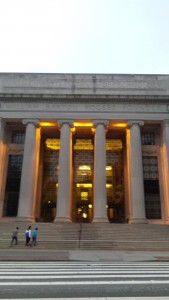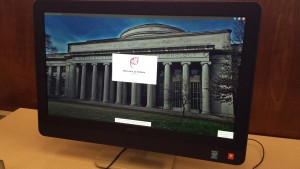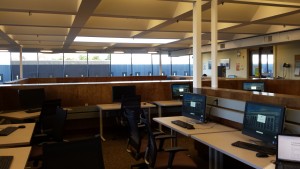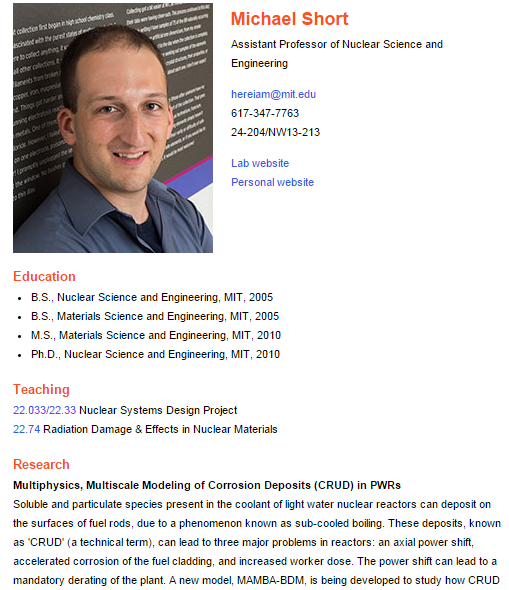So I’ve been at RSI for about 5 days now, and there’s definitely lots of awesome things to talk about. I should probably start off with my initial reactions to arriving on the MIT campus and getting settled in. As a somewhat country Australian kid, the sheer prestige and atmosphere of Boston, and particularly Cambridge of course, was a bit overwhelming at first. I had been here almost exactly 2 years ago, as a tourist with my parents looking around the East Coast. Looking at MIT now is almost exponentially more daunting then back then; simply because now I’m not just witness to science and research, but I’m now a part of it.

Saturday and Sunday were fairly relaxed and good time to settle in and get a feel for the campus, but Monday was an abrupt and somewhat brutal reminder that the next 6 weeks weren’t for sightseeing; serious science was about to fire up. We all did Humanities lectures in the morning and a selection of Biology, Chemistry, Physics or Mathematics. I chose Physics and Maths, for reasons still unbeknownst to me. They were certainly fun, and the lectures themselves I feel deserve their own blog post.
This week we also had several classes deep down in the sub-basement computer labs in which we learned to use MIT’s archaic and esoteric Athena network. Based on a Linux operating system, we all learnt how to use code for navigating the intriguing system with a blinking orange cursor, and obscure commands such as cd, ls, gedit and evince. Those of use with minimal coding experience were quickly introduced to the world of commands, syntax and the mysterious dichotomous logical/illogical computer behaviour.

On Tuesday we got our first taste of the core academic nature of RSI – the Mini Paper. The Mini Paper topic is different each year, and is an open-ended prompt for a 2-4 academic paper of some kind with very simple requirements: A hypothesis, an (statistical) analysis, figure, table and two citations (minimum). The actual paper itself is totally open to the students, and this year the topic was Hamlet. Now most people took this to mean the play Hamlet by William Shakespeare which we were all required to read for the first week humanities classes, but the objective of the investigation broadly ranged amongst the 85 students from statistical analyses using surveys determining people’s opinions of characters, linguistic analyses of the text itself to paper chromatography and physics book-drop experiments. My own mini paper which I handed in about 3 hours ago took a slightly different approach – comparing hamlets (as in small settlements with a population >1000 people) in Massachusetts and Denmark (the location of the play Hamlet). I’ll expand on the mini-paper endeavour and adventures in the academic framework LaTeX in another post.

We’ve had several guest lectures this week
Finally, about an hour ago from the time of writing we all attended the Meet your Mentor night in Lobby 10, in the middle of the Roger’s Building. Some of us unfortunately did not get to meet our mentors that night because of various reasons, but most of us had a blast finding out the topic of our research project and all about what we’d be spending the next 5 weeks on. My own mentor, Dr Michael Short, was unavailable on the night due to him being in Kazakhstan at a conference, however my Saudi Arabian friend, Faisal, met his mentor who works in the same field as mine – the Nuclear Science and Engineering Department. The NSE works closely with the experimental nuclear fusion and fission reactors, and works on everything to do with nuclear physics. I couldn’t ask for a better research placement! I’m still not sure on the exact specifics of my own research project other than it is a mix of nuclear physics and material science, but Faisal’s mentor has told us that our projects will have a large degree of freedom for where we take it, and from his weekend academic reading list we’ve inferred that he will be looking at nuclear powered space propulsion technologies for the Human Mars Exploration project being run by NASA. Exciting stuff, to say the least.

What is for certain is that I will have the opportunity to learn about the intricacies of nuclear physics, and most excitingly, have a look around the tokomak nuclear fusion reactor on campus! Who knows, maybe it’ll turn out I’ll get to do some experiments with it too…
Fingers definitely crossed.
-A
Leave a Reply